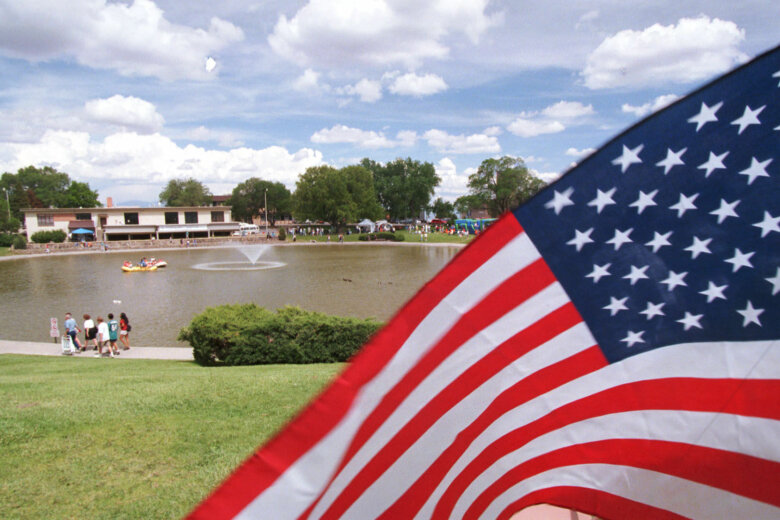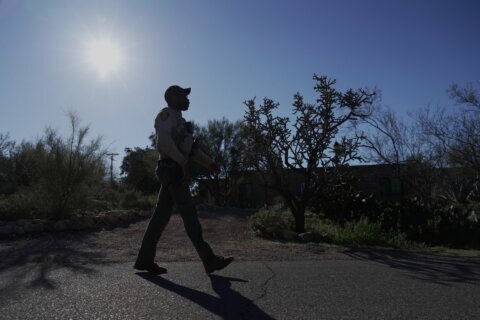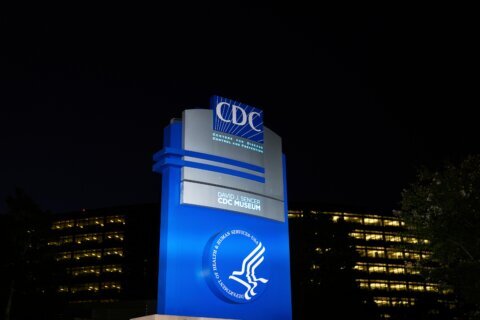
As the country reopens in an ongoing pandemic, Los Alamos County, New Mexico, has been ranked the healthiest US community for the second year in a row.
Located roughly 40 miles from Sante Fe, the county is home to canyons and mesas connected by a 58-mile trail network, 13 developed public parks and an expansive golf course. The community of more than 19,000 people scored highest in the housing, population health and infrastructure categories, according to the annual U.S. News & World Report Healthiest Communities rankings report published Tuesday.
It’s the first community to take the No. 1 spot more than once since U.S. News launched the rankings in 2018, according to the report.
Known for its vast, breathtaking mountain ranges, Los Alamos County also ranked among the best communities for factors such as low Covid-19 case rates, citizen income, employment and educational achievement. However, the county and the four runners-up — Douglas County, Colorado; Falls Church, Virginia; Loudoun County, Virginia; and San Miguel County, Colorado — all scored below average in the subcategory of educational equity.
“A healthy environment is part of what definitely contributes to (Los Alamos County) being a healthy community,” Los Alamos County Council Chair Sara Scott, who wasn’t involved in the report, previously told CNN. “People have the opportunity and the interest in getting out, taking advantage of our mountains, trails, biking, horse-riding (and) golfing.”
When Los Alamos County ranked No. 1 last year, Scott said a giving community that takes health and safety seriously contributes to what makes the county so healthy overall.
That has included pandemic-related donations, volunteer mask-making, up-to-date communication between health officials and citizens on safety precautions, and the public’s compliance with the county’s layered public health response. Census responses, too, have helped county officials identify needs and priorities, Scott said.
Colorado counties Gilpin, Teller, Pitkin, Summit and Park earned the top five spots of the environment ranking, which considered factors like air quality, drinking water safety, amount of land area covered by trees, and how many people lived within a half mile of a park.
U.S. News and the University of Missouri Center for Applied Research and Engagement Systems based the rankings on how nearly 3,000 US communities scored on 84 health and health-related metrics placed within 10 categories: community vitality, equity, economy, education, environment, food and nutrition, population health, housing, public safety and infrastructure. For each metric, the researchers scaled the values for each community relative to the average for that metric.
A community’s public health past affects its present
Most data used to establish the rankings predated the pandemic, but some tools did highlight counties’ Covid-19 case and vaccination rates. Kauai County, Hawaii, for example, had the lowest case rate, with 444 cases per 100,000 residents between the start of the pandemic and May 31, 2021. And four of the top 10 communities had full vaccination rates that were higher than the national rate of 41.4% as of June 4, according to the report.
Conversely, vaccine hesitancy was associated with poorer health scores: None of the 10 most hesitant counties landed in the top 100 healthiest communities — but six of the 10 least hesitant counties placed in the 100 healthiest communities.
“What I learned in talking to health care and public health experts is that … the type of public health infrastructure and trust in public health that you need to have for a pandemic is something you start building, not at the time of the pandemic, but 10 years earlier,” said Alex Matthews, a data editor at U.S. News & World Report.
“Many of the counties that have, like, really high vaccination rates also scored well on our food nutrition category. And those two things don’t seem related (at first),” Matthews said, adding that in some communities, a Fruit & Vegetable Prescription Program connects local farmers with families who need affordable access to produce.
“What ends up happening is, years down the line when the public health authorities come to you and say, ‘Hey, we need you to wear masks’ or ‘Hey, we need you to get this shot,’ you think to yourself, ‘Well, of course. These people are invested in my health; they’ve been investing in it every day. So I’m going to listen to them, and I’m going to trust them.'”
The top community for mental health
Counties in Hawaii took the top three spots in the mental health category, with Honolulu County ranking No. 1.
Honolulu has “coordinated systems that focus on making sure they’re keeping track of” and responding to residents who are experiencing mental illness, homelessness and other crises, Matthews said.
Community measures of “physical health and well-being can also impact mental health because they can limit or support the way individuals are able to move through their day and interact with their community,” Susan L. Polan, the associate executive director of public affairs and advocacy at the American Public Health Association, previously told CNN. Polan wasn’t involved in the study. In the report, poor mental health was associated with higher rates of poverty, inadequate physical activity, heart disease, diabetes and lower life expectancy.
U.S. News produces the rankings to inform community health officials of best policies and practices for productive, healthy lives, according to the report.
When scoping out potential homes, people should assess whether the area is “is a cohesive community with easy access to healthy food, safe places to play and walk, good schools, diverse residents and leaderships, affordable housing, public transportation and a full range of other services,” Polan said. Local governments interested in investing in communities and economically sound, locally involved businesses are other good signs of healthy residential areas, she added.
The Healthiest Communities project results from support from the Aetna Foundation, a health philanthropy organization; CVS Health; and the University of Missouri Center for Applied Research and Engagement Systems, a research institution for community health. Researchers based the rankings on data from the US Centers for Disease Control and Prevention, Centers for Medicare & Medicaid Services, Census Bureau and Environmental Protection Agency.








